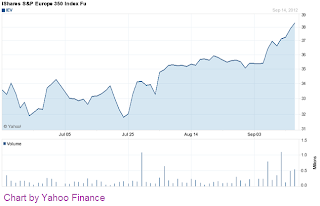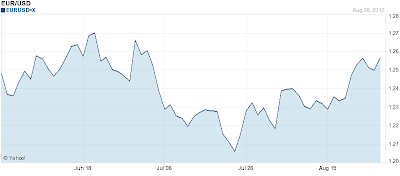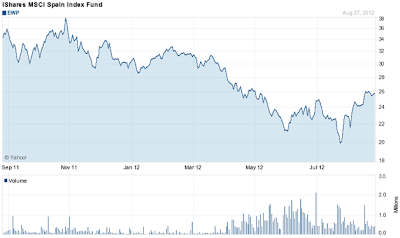Huge Gains Possible for European Stocks
Our founder earned clients a 23% average annual return over five years as a stock analyst on Wall Street. "The Greek" has written for institutional newsletters, Businessweek, Real Money, Seeking Alpha and others, while also appearing across TV and radio. While writing for Wall Street Greek, Mr. Kaminis presciently warned of the financial crisis.
In March of 2009, it seemed to most Americans, and especially stock market participants, that all was lost. Yet, in the depths of the financial crisis, and well before economic recovery began, stocks marked bottom. That fateful day, March 3, 2009, was the point of inflection. From that day through the end of 2009 the SDPR S&P 500 ETF (NYSE: SPY) gained roughly 63%.
Obviously, serious obstacles remain which might alter the recovery scenario for Europe. For instance, if war breaks out in the Middle East, involving Iran, Israel, other Middle Eastern nations and global powers, all bets are off. The Iran war factor is neither negligible nor insignificant.
Likewise, political disruption within struggling European nations could alter the path for European shares. For instance, the last elections in Greece reflected the frustration of the Greek people with harsh austerity and almost led to Greece’s withdrawal from the euro zone. The result of such an event could have driven similar change in other PIIGS nations, and taken the euro-zone down a completely different direction. Those risks remain.
Finally, economic deterioration within Europe could spark up concern again. For instance, if the rating agencies, Standard & Poor’s (NYSE: MHP) and Moody’s (NYSE: MCO), downgrade Germany’s sovereign debt rating, that would reignite concern. A warning has already been issued to Germany, and its economy has begun to show cracks.
Another group that should benefit substantially from gains made by Europe are the banks with substantial risk tied to the region and the system. This is why the shares of Citigroup (NYSE: C), Bank of America (NYSE: BAC), J.P. Morgan Chase (NYSE: JPM), Goldman Sachs (NYSE: GS) and Morgan Stanley (NYSE: MS) have participated in the latest three months of gains. The shares of Citigroup (C), for instance, are up 32% since July 26; the rest of the group is up similarly. It’s quite ironic that it was Citigroup which sparked the turnaround in American stocks in 2009, when it first reported good news. Other bankers, including Jamie Dimon of JPM, added to the change in tone and stocks never looked back.
In conclusion, I reiterate that while substantial opportunity exists for European and related securities, special dynamic risks could hamper the repeat of what American stocks accomplished in 2009. As always, you are advised to pay close attention to developments and risks, and welcomed to follow my feed which will likewise do so.
Please see our disclosures at the Wall Street Greek website and author bio pages found there. This article and website in no way offers or represents financial or investment advice. Information is provided for entertainment purposes only.

Labels: Editors_Picks, Editors-Picks-2012-09, Europe, Europe-2012-Q3, Market-Outlook, Market-Outlook-2012-Q3
































